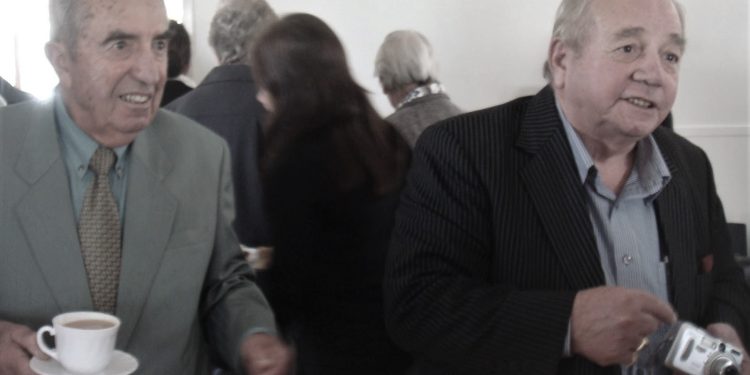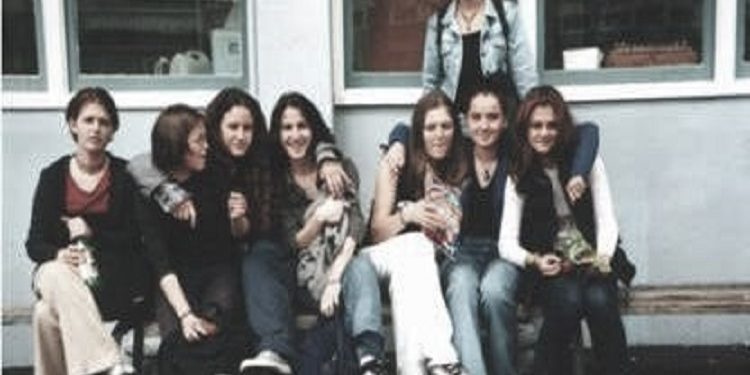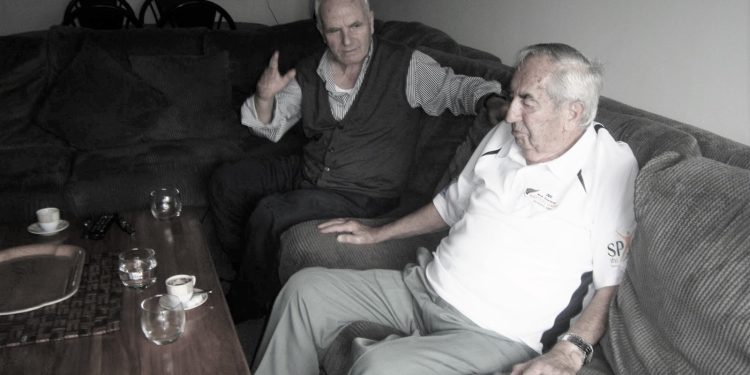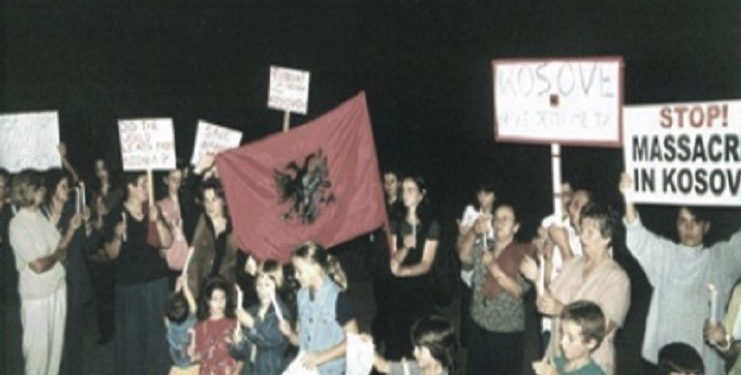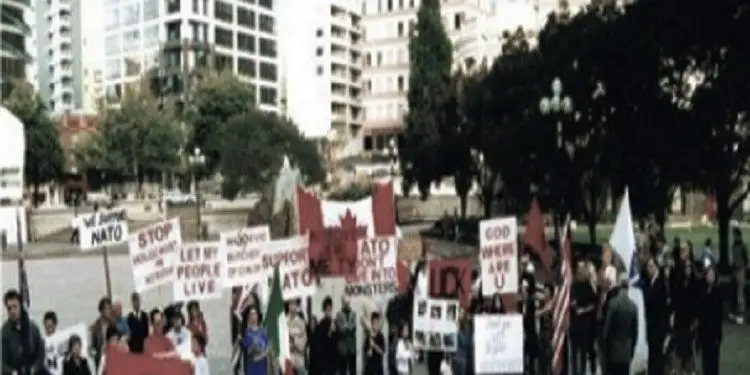By Sabit Abdyli
Memorie.al / The first Albanians who immigrated to New Zealand came during the 50s. One of them, Petrit Alliu, tells how they arrived in New Zealand from Istanbul with the steamer “Goya” on May 1, 1951. The exact number is not known, but on that steamer, according to Mr. Alliut, there were more than 60 Albanians, all male and young, from all our ethnic areas. Each of the newcomers has his own creepy and terrifying story, during the escape from his hometown. ‘Aotearoa’, as the first Maori settlers called New Zealand (in Albanian: land on which big white clouds stand), is located on the south-western side of the Pacific Ocean, 8,000 km. far from the coast of South America, while in the north 2,000 km. separate it from the coast of Eastern Australia.
It has an area of 269,000 square kilometers, roughly the size of Great Britain and Japan. The ethnic structure is dominated by the newly arrived European population. Zealand consists of two main islands: the North Island and the South Island. The land of big white clouds is volcanic hilly land rich in vegetation, rivers, thermal waters, lakes, waterfalls and mountain ranges.
The imposing mountain ranges of stunning beauty and perpetually covered in snow are the Southern Alps, which stretch across the South Island. The highest peak of these mountains, goes up to 3754 meters high, Mountain Cook. Zealand is 1500 km long. from north to south.
The northern island is characterized by a milder temperature and denser population. The first people settled on this remote island shortly before the 10th century. In the Land of white and big clouds, as the first arrivals (Maori) called it, when they came, they found paradise, the place where they organized a new life on a new earth, and they are still very proud of it today. Located in the middle of the Pacific, they lived on the products of the land, sea and fishing.
Dutch navigator Abel Tasman, the first European in Aotearoa
The first European to set foot in Aotearoa was the Dutch navigator Abel Tasman, in 1642, who stayed for a while along the west coast and named the newly visited island “New Zealand” after the region of Zeeland in the Netherlands. After 127 years, there follows the visit of the English captain, James Cook, with his sailors, who came from Tahiti, 1769. In 1814, for the first time, English missionaries came to spread the Christian religion.
On February 6, 1840, after the signing of the treaty between the natives (MAORI) and the representatives of Queen Victoria, in the town of Waitangi, Great Britain declared New Zealand as its colony. In the years that followed, arrivals continued with increased intensity from Great Britain, and later also from other countries in Europe, Asia, etc. Today, in this country with over 4 million inhabitants, many cultures, languages and races of people coexist in complete harmony, among them Albanians who came here after the application of the Slavic-communist system in 1945, in Albanian lands, that is, in the beginning of the fifth decade of the 20th century.
The chronicle of migrations of Albanians to the state of peace, tranquility and order, are part of the painful history of displacements with repression and violence from their lands. The Albanian emigration in New Zealand is one of the youngest emigrations, considering the time of emigration from all other Albanian communities around the world.
The first Albanian emigrants on the steamer “Goya”, April 1951
Albanians came to the distant island with the steamer “Goya” About the emigration of the first Albanians to New Zealand, Petrit Alliu, one of the first immigrants to Zealand, tells: “We arrived from Istanbul with the steamer “Goya” in Zealand on May 1, 1951. I don’t remember the exact number, but we were more than 60 Albanians, all male and young from all our ethnic areas.
I am mentioning some of them: Fadil Kaceli, Shaqir Seferi (deceased), Besim Kazazi (deceased) and Lulzim Pogoni from Tirana, Shaban Kryeziu, Jorgji Harillamsi, Halit Bajrami, (former soldier and State Security Operative who together with Xhevdet Mustafa and Sabaudin Hazendari, landed as a saboteur in Divjakë, Albania on September 24, 1982. Xhevdet and Sabaudin are killed by Albanian Security agents, while Haliti surrenders himself. After a stay in “prison” in Albania, he returns to New Zealand.
Died in Auckland, probably in 2007), Bahri Kavaja from Shkodra, Masar Krasniqi from Pristina, Zydi Zequllari e Islam Kulla (deceased) from Korça, Bajram Murati from Vlora, Musa Hajdari from Muzeqina, Nevruz Mullaj from Gjirokastra, Sabahudin Qefaliu of Qamil Hasani, from Tetova, Ramazan Daja (deceased) from Petrela, Kamber Rustemi (killed by UDB in Australia, from Vlora), Vilson Shkambi, Xhelo Resuli, K. Myrtezai, Ramadan Nazifi (deceased) from Labëria , Nazmi Mehmeti from Gostivari and others. The way we looked at the world was very painful and each of us has our own creepy and terrifying story, during the escape from our homeland”, says Mr. Alli.
“In addition to Albanians, there were also Romanians, Bulgarians, Slovenians and Bosnians on the steamer “Goya”. First, we are settled in Pahitua, a town near Wellington. After six weeks, we were distributed all over Zealand to farms, providing each with an identification card and a work permit. We quickly found ourselves and for a while we adapted to the new environment. After two years, we had the right to settle and work where we wanted. Some of us settled in the city of Auckland. With work, we created good conditions for living. I believe that even before us, there were Albanians in New Zealand. When we arrived, we met an Albanian lady, who came from Egypt, who spoke Albanian well. I don’t know what happened to him later.
There was also talk about three other Albanian women from Llogoraja and Vlora, located here before us, then about the Albanians from Australia who had come to look for gold in the rivers here, but they did not stay long in New Zealand. However, we were the first Albanian political immigrants, in such a large number, settled on this remote island. Here we formed the “Albanian Civic Association” in New Zealand. The President of the League, Mashar Krasniqi and all the rest of us, focused our efforts on preserving traditions, language, maintaining connections, attitudes in raising awareness of the unresolved issue of Kosovo with our sister Albanian exiles in Australia, in America and elsewhere.
We gathered during weekends and holidays and never forgot where we came from, never lost hope that one day, the red dictatorship will break its neck. On the occasion of the Flag holiday, we used to meet at the house of one of us and celebrate as a family, in front of the red and black flag, sing the anthem, listen to Albanian music, evoke the past…! Today, even our children in this beautiful country, with true democracy, have created their own families and live in the comfort of the standard of the Zealand society”, says Mr. Alliu, who was born in Tirana in 1930, escaped from his homeland in 1948, first to Turkey, and then to New Zealand, a respected personality and a well-known name in Zealand football, in the years 1952-1956.
Around the 70s – 80s of the last century, there were individual arrivals, and after 1990, due to the persecutions, imprisonments and murders of Albanians in Kosovo, the mass exodus to Albania, the number of those who were coming to New Zealand. The second, the last, wave of mass immigration took place after the violent displacements, the genocide in Kosovo, in the spring of 1999. On May 22, 1999, the first Albanian refugees arrived, who were received in an organized manner by the Government in the refugee camps in Macedonia. At the Auckland airport, the entire Albanian community, large and small, many New Zealanders and others, led by the then Prime Minister of the Government of Zealand, Jenny Shipley, with her associates, as well as representatives of the opposition, came out to welcomed the refugees from Kosovo.
The new refugees of 1999
“The arrivals in Zealand continued throughout 1999. It should be mentioned that among the refugees, there were prominent personalities of Albanian culture and science, such as: Academician Enver Gjerqeku, writer Rexhep Hoxha, Dr. Hysen Ukmata, etc. The new arrivals, (with the exception of four families that arrived in 2000), were related to the Zeeland Albanians. The expectations were warm and exciting.
After a week’s stay, in the Mangere camp, they are welcomed by Albanian families, and then go through their rented apartments. All settled in Auckland, suburbs: Orakei, Mission Bay, Pakuranga, Medolbank, Sten Jons, Kohimarama, Glendowie, Panmure, Onahunga, St. Heliers, Mt. Wellington, Buckland Beach, Epsom &c.
In the newly arrived city and in an organized manner, the Albanians started with English language courses, to then continue with retraining for various professions. A number of them, after a year, voluntarily returned to Kosovo. The qualification structure of Albanian expatriates is high. The young people continue their education in the respective schools, the primary school students are scattered among the schools where their families are located, while the high school students, almost all of them attend the secondary school “Selwyn College”, Kohimarama.
All Albanian immigrants who arrived in 1999 settled in the big city of Auckland. Thanks to their cultured behavior, honest work, Albanians, here in Zealand, are respected as hardworking and good family people. As everywhere in the world, here too, Albanians are showing themselves to be capable and smart workers, especially in the field of economy and business. The arrivals in 1951 were mainly from Albania, while the arrivals in 1999 are from Kosovo. The Albanian community is concentrated in the city of Auckland. It is possible that there are Albanians in other cities as well, but we do not know them. In conversation with expatriates, who have been following the movements and arrivals of Albanians, it turns out that there must be somewhere between 400 and 500 Albanians in New Zealand.
The Albanian arrivals, (I am talking about the 1999 immigrations), who are all concentrated in the city of Auckland. Albanians make up a small but important part of the multicultural city. The favorite place for Albanians is in front of the ‘Mission Bay’ neighborhood, where they conduct hotel activities with great success: Muharrem Muharremi – (Mema), Xhelal Jashari and Bajram Jusufi.
Their restaurants stand out for their food specialties, timely services, cleanliness and order. In this wonderful neighborhood of the largest city in New Zealand, there is a well-known salon for men’s and women’s hair, which bears the signature of the hairdresser from Pristina, Agim Agollit, “Gimmy’s Hair Desing”.
The owner of the company for the production of ice cream, Tair Tairi, has expanded his activity, opening these days in Mission Bay sweets, according to the yrnek of sweets in Pristina and Skopje. In the group of Albanians who have found success through restaurants, there is also businessman Abdullah Bashota, with his well-known restaurant; “Red Elephant”, as well as young people Sokol Krasniqi and Astri Jolla, with the restaurant “Safran”, in one of the most luxurious neighborhoods of the city in Newmarket. It must be said that the majority of workers in the mentioned restaurants are Albanians. Salih Salihu, with his sons; Albanin, Agronin and Drilon, for a short time managed to become a typical model of a successful businessman.
To the group of businessmen, the names of Burim Xharra, Ismet Selim, Ideal Huskaj, Burim Prekazi, Agron Hasani, Drin Murat, Sharr Brezarti, etc., who have their own businesses, should be added. Another number work in commerce, administration, construction, medicine, etc. On this occasion, we should not forget the young Albanians, who have completed their studies and those who are expected to complete them at the University of the city of Auckland, who within a few years, will be the “stars” of intellectual work and business in this developed country.
The café is located in the central part of Auckland, from whose terrace you can see Rangitoto Island, known in the world for its unique shape. On the terrace of the café, the Albanian-Zealanders meet and talk: about problems, longing for their homeland, events in Kosovo, Albania, they beat their chests and exchange robes with laughter. Drinks for them do not have a primary function, because they come here exclusively to cry about their problems to each other, change cigarettes, get rid of boredom, pass the time and debate various topics.
As everywhere in the world, the Albanian diaspora here in the country with a rich history and experience, in terms of tolerance and inter-ethnic and cultural understanding, is facing the problem of preserving the language and national identity. While the number of our children is increasing, preserving the language and learning it is becoming more and more difficult. The Albanian community should be made aware that providing a permanent venue, where they would develop activities, open classes for learning the Albanian language and through it also culture, history and everything else that has to do with Albanians, is more than necessary.
This can be achieved quite easily, when we consider the great intellectual potential that Albanians have here: teachers, professors, economists, engineers, doctors, architects, pharmacists, dentists, then New Zealand is a warm country that offers great opportunities realization, if you have the will and love for yourself and for your Nation”. Memorie.al




